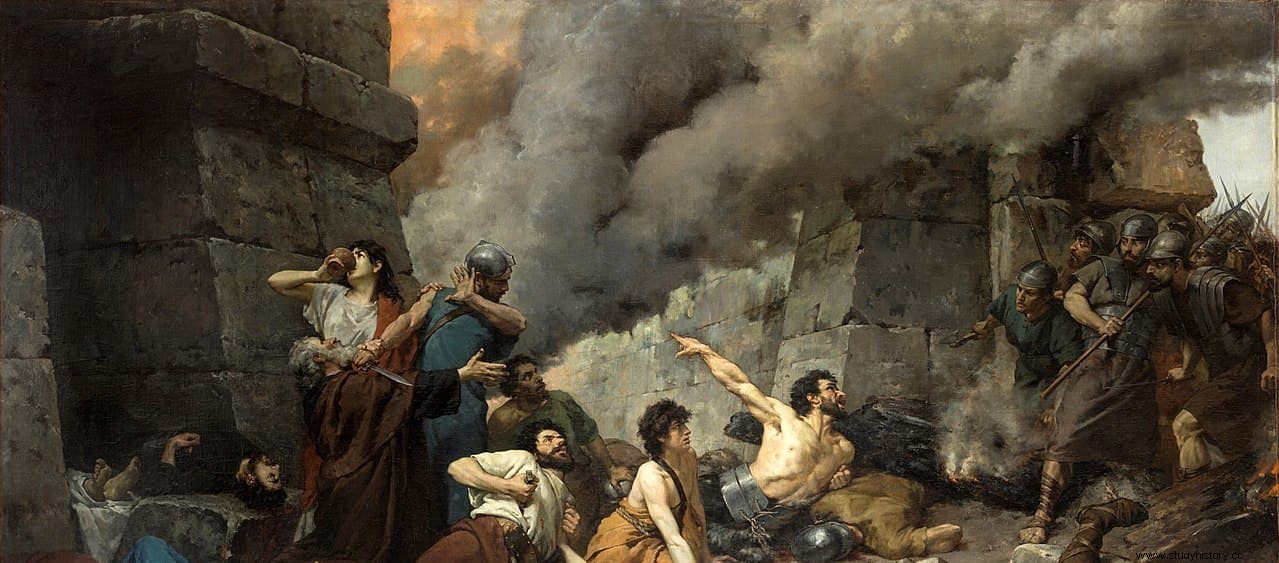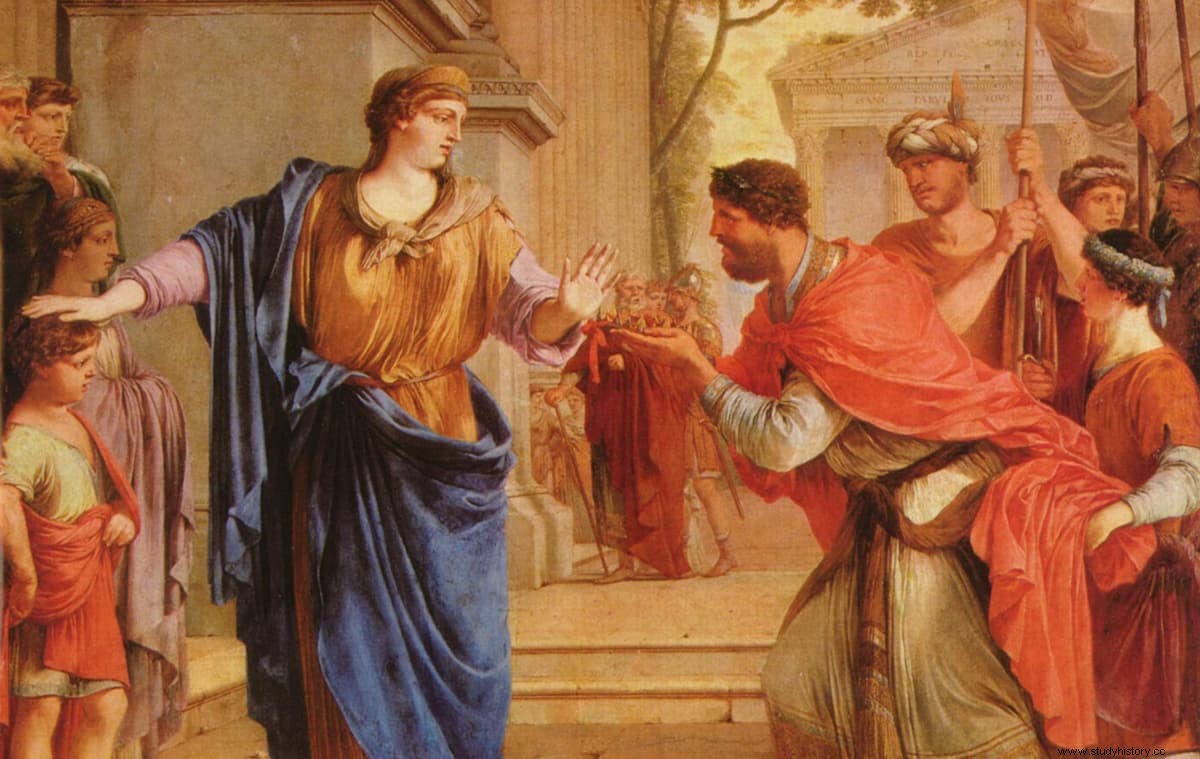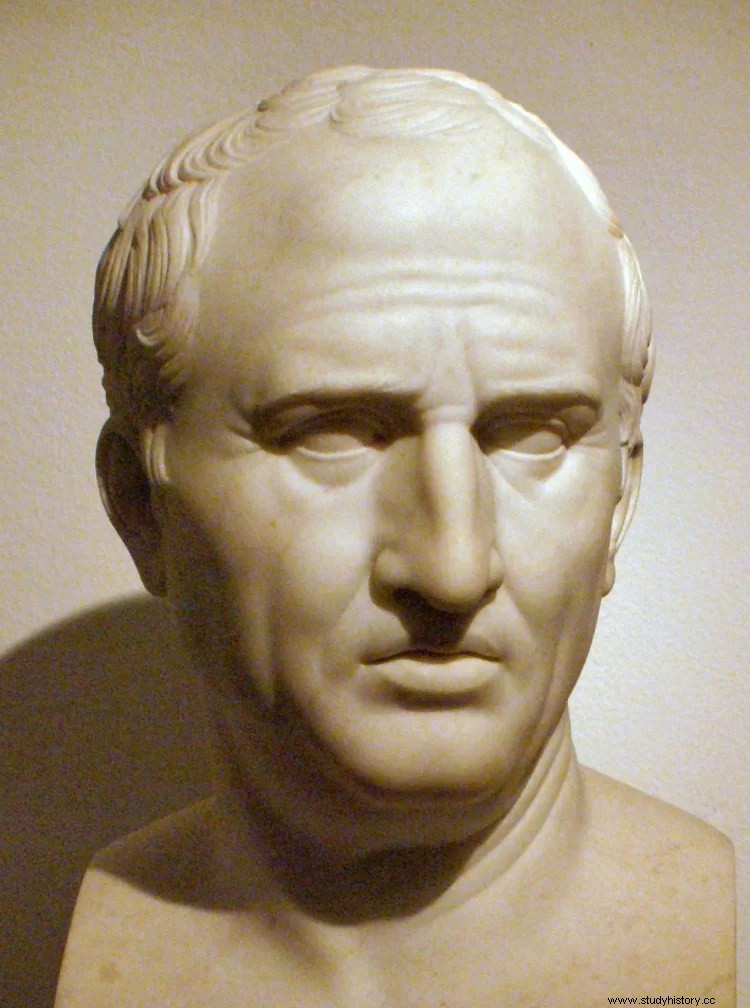The dictionary of the R.A.E. generically defines satire as a “sharp, pungent, biting speech or saying, aimed at censuring or ridiculing” . Something that must be as old as speech itself and, therefore, without an assigned inventor. Now, when it is taken to literature, it adopts its own form, a composition in verse or prose that, in this case, does have someone to call a father:the Roman writer Lucilius.
It is not for less, since this author came to publish up to thirty volumes to which he gave the common title of Satirae (Satires). A good part of them have been lost and only about 1,300 fragments of varying lengths are preserved, but they are enough to know that they focused on three main themes. One is the human condition; another, of course, politics; and the third, himself. His great merit was daring to dedicate his life to writing, considering that he was noble; in fact, he would be the first well-to-do Roman to do so as a trade.
And it is that Gaius Lucilio was born into a family of the ordo equester , that is to say, the equestrian order, an intermediate social class between the superior of the patricians and the inferior of the plebeians, whose name dates back to the times of the monarchy and alluded to the economic capacity of some citizens to serve in the army contributing two horses. Lucilius was born much later, in the 2nd century BC, when the equites had become rich by engaging in business and acquired the right to assume some magistracies.

The character in question was born in Suessa Aurunca, Caserta (Italian region of Campania), in an uncertain year between 180 B.C. and 147 BC. The doubts for such a difference come from the fact that some events that he records in his works were prior to that second date, which would mean that he lived much earlier. The biographical data makes things more confusing, since, according to the Roman historian Velius Paterculus, he was a friend of Scipio Aemilianus, whom he met in Hispania in 133 BC. while serving under him during the siege of Numancia. Said friendship is corroborated by Horacio, an author with whom he also had dealings and who also wrote a book of satires.
This implies that, if he had been born in 147 or 148 BC, Lucilius would have been in the army when he was fourteen or fifteen years old, something as unlikely as the Scipios having received him into his family, since it must have been already in the maturity of the. The discrepancy of dates increases when it is said that he began to write his work in the cited 133 B.C. and he finished it in 129, the year of the famous general's death, which would make him nineteen; It would be an unusual case of precocious literary genius and it is not very credible, especially considering that it was a new genre.
However, experts do believe that it is possible that Lucilius began writing his verses during Scipio's lifetime, given that some fragments are presented as a conversation between the two and refer to relatively recent events. An example could be the Numantine war, which he refers to as having ended shortly before, or the defeat in 138 BC. by Marco Popilio Laena (not to be confused with his ancestor, who lived in the fourth century BC, was consul four times and defeated the Gauls), which the poet opposes to the Hispanic triumph of Scipio.

It is also interesting to know that his sister Lucilia married Sextus Pompey and would have a son with him named Sextus Pompey Virdoctus, famous for being a politician and for being the uncle of Gnaeus Pompey, the illustrious Pompey the Great , the triumvir who faced Julius Caesar in a civil war for control of Rome. Therefore, she was the paternal grandmother of that famous character and her brother, the great-uncle.
Aside from that dubious stay in Hispania - at least under those conditions - Lucilius spent most of his life in Rome. However, it seems that as a young man he made a trip to Greece with the aim of broadening his philosophical culture. In fact, in the Satires of him he demonstrates a wide knowledge of Greek customs, which, by the way, he does not leave in a good place:in his verses he distills criticism towards a relaxed morality that would have infected the Roman aristocracy to the detriment of the virtus traditional, heir to Stocism, which represented the Scipionic Circle.

That was the name of a group of Roman politicians, philosophers and poets sponsored by Cornelia, the mother-in-law of Scipio Emiliano and mother of the famous Gracchi, who, by the way, Lucilius opposed (Caius and Tiberius, the two tribunes of the plebs who tried to carry out a revolutionary social and agrarian reform, failing in the effort). The members of that circle were promoters of culture and the arts, defending the stoic values of Hellenism against the rancid conservatism of the senatorial class, the mores maiorum (the customs of our ancestors) embodied by Cato the Elder .
Among the best-known Scipios were, apart from those mentioned, Terencio, Polibio, Lelio, Manio Manilio, Publio Rutilio Rufo and Quinto Mucio Scévola. The importance of the group -and that of Lucilius in particular- is evident in the works De amicitia and Republic , of Cicero, which are the most important sources to know about that movement. Lucilius was praised by Persius, Quintilian, and Juvenal (another who also wrote a work titled Satires ). It is not surprising, since he was the creator of a new genre by giving literary form to a tradition, that of satire, which until then had been merely oral, popular and lewd. Interestingly, he did not adopt anything from Greece, stylistically speaking (Greek satires were based on the Menippean model, Menippus of Gadara, mixing prose and verse), and he even began writing mockery of Hellenic tragedies and epic poems.
Yes, he was sympathetic to the new wave of comedies and also used to introduce Greek quotes, because he resorted to an epistolary format that favored him and allowed him to develop a very personal style with which he could approach the most varied topics. Despite his position, Lucilius did not participate in the public life of Rome; but this did not prevent him from positioning himself in some cases, such as when he dedicated satires to the corruption that Senator Lupo embodied or to the Hellenizing obsession of the epicurean Tito Albucio (of whom Cicero said that he was practically Greek). He also made invectives against colleagues like Ennio or Nevio, for writing pieces far from reality.

His pen had no hesitation, hence he did not hesitate to laugh at himself, as when he recounts the many mishaps suffered on a trip he made to Sicily, the adventures of his love affair with a lady named Colira or a banquet he attended at home of a bandit named Granio. Personal experiences were part of his repertoire and he himself often appears as a character. Perhaps part of his success lay in this, along with the fact that he was addressing an average reader, not too cultured but not elementary either.
As for the verses, most are hexameters (that is, six feet), the classics of Greek and Latin poetry, although there were cases in which he resorted to trochaic tetrameters, trochaic septenaries, iambic senaries and dactylic hexameters. The metric has a special importance in this author because a typical characteristic of his thirty books is that they are ordered by that criterion, so that, for example, he wrote the first twenty-one books in the aforementioned hexameters while the next four change to elegiac verses and the rest -probably the first ones he did- were made in the other measures outlined.
Lucilius' date of death is as confused as his birth date. It is known that it happened in Neapolis (present-day Naples), which was precisely a city much admired by the Romans due to its past as a Greek colony, whose culture it preserved in language and customs at the same time as it became Romanized. The death must have come between 103 and 101 BC. and, despite never having held public office, he had a quasi-state funeral dedicated to him; such was the popularity of it.
